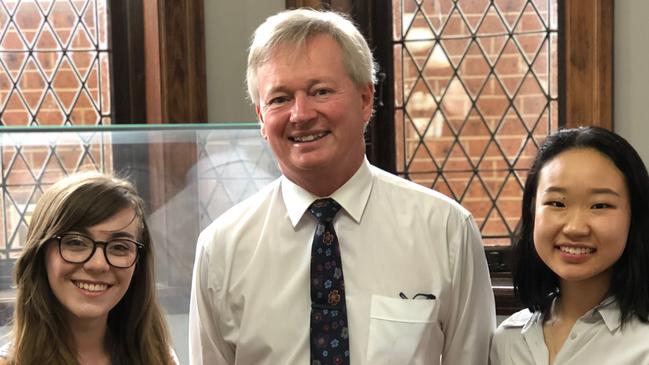Private school head says existing school rankings ‘unfair’
The principal of a private Sydney school says the ranking of Year 12 students’ final results should be abolished.

The principal of a prominent private school says a linchpin of the nation’s education system — the ranking of Year 12 students’ final results — should be abolished, claiming the practice adds to student anxiety and rests on assumptions that are “complete nonsense”.
Dr Paul Burgis, the principal of the exclusive Presbyterian Ladies College in Sydney’s inner west, called for a university entrance system more like Britain’s, in which graduating Year 12 students are given more general marks (ranging from A-plus to E) and are then assessed by tertiary institutions via interviews and portfolios of work.
In an article sent out to school parents yesterday — and prompted by questions posed by The Australian — Dr Burgis acknowledged an anomaly that advantages top-performing students studying imported programs such as the International Baccalaureate and Cambridge “A” levels, over high-achieving students who study domestic curriculums such as the NSW HSC.
“It is true that both the IB and Cambridge (or other) ‘A’ levels have a potentially unlimited number of 99.95 scores,’’ Dr Burgis said.
“This is not the same as the HSC, where only a limited number are given.’’ (Similar caps apply in the Victorian Certificate of Education and ranked domestic curriculums in other states.)
Dr Burgis blamed this discrepancy on the strict ranking of the 50,000 or so HSC students who apply for university places every year.
“The main issue is the rank. Remove it and award grades based on outcomes and we won’t have the problem,” he wrote.
“… It is complete nonsense to think a student who scores 96.75 is going to be measurably better at university than a student who scores 96.70 or 96.65.” He added that ranking “also increases the chances of student anxiety”.
Dr Burgis’s school plans to introduce Cambridge A Levels for Years 11 and 12, alongside the HSC that it already teaches, from the early 2020s.
Dr Burgis wrote his article following an interview with The Australian, which is investigating how serious anomalies in the university entry system are benefiting students who study the IB at the expense of students who study state-based curriculums.
The Universities Admissions Centre, which converts students’ Year 12 results into tertiary admission ranks, or ATARs, has acknowledged the anomalies and hinted that it is considering reforms to make the system fairer.
The non-selective Sydney private school Trinity Grammar recently announced its 2018 Year 12 cohort had produced a record nine perfect IB scores that translated into perfect 99.95 ATARs — despite coming 111th in the HSC league table.
Trinity’s nine perfect scores exceeded those of the three fully selective schools that topped the HSC. When interviewed by The Australian, Dr Burgis agreed Trinity’s haul of perfect IB scores was astonishing.
In his newsletter, he referred to it as “excellent”.
He said studying the IB could raise or lower a student’s result, with top students being scaled up and lesser students being scaled down. He said his school had not adopted the IB because its marking “is not as consistent as I believe it should be — try tracking school results over time”.



